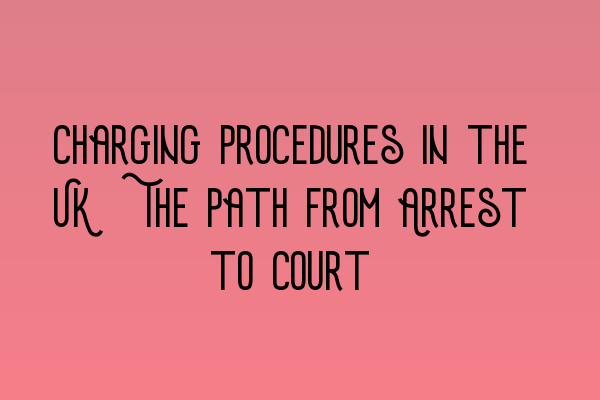Charging Procedures in the UK: The Path from Arrest to Court
Welcome to the blog of SQE Criminal Law & Practice Law UK! In this article, we will explore the charging procedures in the UK and provide you with a comprehensive understanding of the path from arrest to court. Understanding these procedures is crucial for anyone involved or interested in the criminal justice system.
Arrest and Detention
When a person is suspected of a criminal offense, they may be arrested by the police. The police have the power to arrest someone if they have reasonable grounds to believe that the person has committed or is in the process of committing a criminal offense. Once arrested, the suspect is taken to a police station and may be held in custody for questioning. The police must inform the suspect of their rights, including the right to legal representation.
Investigation and Evidence Gathering
Following the arrest, the police will proceed with the investigation. This involves gathering evidence to determine whether there is enough to charge the suspect. The investigation may include interviews, witness statements, forensic analysis, and other investigative techniques. The police must conduct the investigation in a fair and impartial manner, ensuring that all relevant evidence is considered.
Charge Decision
Once the investigation is complete, the police will make a charge decision. This decision is based on the evidence gathered during the investigation. If the police believe there is enough evidence to provide a realistic prospect of conviction, they will charge the suspect with the relevant offense. However, if the evidence is insufficient, the police may decide not to charge the suspect and release them from custody.
It is important to note that the decision to charge a suspect is ultimately made by the Crown Prosecution Service (CPS) in England and Wales, or the Procurator Fiscal in Scotland. The CPS or Procurator Fiscal will carefully review the evidence provided by the police and make an independent decision on whether the case should proceed to court.
Pre-Court Proceedings
Once the suspect is charged, they will go through a series of pre-court proceedings. These proceedings are designed to ensure that both the prosecution and defense are adequately prepared for the trial. Pre-court proceedings may include case management hearings, disclosure of evidence, legal representations, and any necessary applications to the court.
Arraignment and Plea
The arraignment is the formal stage where the suspect appears in court and enters a plea to the charges. The defendant may either plead guilty or not guilty. If the defendant pleads guilty, the case may proceed to sentencing. However, if the defendant pleads not guilty, the case will proceed to a trial where the prosecution must present evidence to prove the defendant’s guilt beyond a reasonable doubt.
Conclusion
Understanding the charging procedures in the UK is essential to navigate the criminal justice system effectively. From the initial arrest to the pre-court proceedings and the final plea, each step has its significance in determining the outcome of a criminal case.
If you’re preparing for the SRA SQE exams, be sure to check out our related articles:
